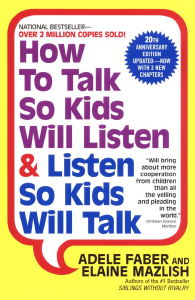Ever since my teen years, one of my major life-goals has been to become a parent who lives out the principles in this book. Truly.
I first read How to Talk So Kids Will Listen & Listen So Kids Will Talk when I was in high school, working a summer as a day-camp counselor for a group of six-year-olds. I really liked the kids, but I was at sea in the discipline department. So I wandered over to a bookstore one Saturday, randomly chose this book, and ended up having my life profoundly affected.
It’s not so much that this book offers magical “tricks” to get your kids to do what you want them to do, although it is written in an eminently practical, easy-to-apply style. Instead, the book offers principles (and I’d even say biblical principles, though the book is clearly not religious) to live by in parenting. (You can get more of the background about how this book came about by reading another of Faber & Mazlish’s books, Liberated Parents, Liberated Children.)
The main threads woven throughout the parenting scenarios in this book are *empathy* and *respect.* The first chapter, “Helping Children Deal with Their Feelings,” is all about empathy, the art of understanding how another person is feeling. The authors propose that many arguments, tantrums, and acts of defiance really stem from the fact that the children are in some kind of distress and are not being completely understood by the parents. So, when little Rosie is throwing a fit about wanting to go to the park in sub-zero temperatures, they propose that you empathize with her (“You really wish you could go to the park! You love to slide down the slide!”) instead of trying to reason with her (“Rosie, it is too cold to be outside! You should be thankful for a warm house!”). Somewhere in the book they offer this maxim, which I find to be very true: “If a child isn’t acting right, the child doesn’t feel right.”
I really appreciate that Faber and Mazlish don’t validate the feelings only of children, they validate the feelings of parents, too. In their eyes, parents are not expected to be calm and patient all the time, mythical beings who are always loving, always generous. They know that parents need a productive way to express their anger and frustration at times, or, like the children, they won’t be able to “act right” when they aren’t feeling right. The authors give lots of constructive suggestions for engaging cooperation in the family, sorting through disciplinary tactics, and taking one’s own needs into consideration while parenting.
One of the clearest instances of respect in this book is shown in the “problem-solving” section of the chapter, “Alternatives to Punishment.” The authors walk us through the steps of resolving persistent problems: talk with the child (and listen!) about each other’s perceptions of the situation, brainstorm ideas, and try out a solution together. I love the fact that children are involved in solving the problem — that is it not just something that the parent has to “fix” or that the child has to “do.” Instead, children are asked to be real participants — and, as they see their ideas valued and respected, their ownership of the solution grows. I’ve been working on this skill with Lucy for several months, and we have had some successes in partnership, even at the age of three years (“That would be a good idea, Mama!”). Even when solutions “fail,” they haven’t really failed, because parent and child are still a team and can go back to the drawing board together again. I love the way this concept pulls my focus away from the “task” and back to the relationship — because really, the relationship is the true goal, not “getting hands washed” or “putting toys away.” This simple principle, in my experience, can transform a bad day into a great day.
There are many helpful ideas in this book, most of which are based on good communication skills and can be easily utilized in adult relationships (and I do!). I could go on and on about them, but let me shift gears here and give you a bit of personal background about why this book has been so transformative for me.
Most people have something that they want to do differently from their own parents as they raise their children, and I am no exception. One of my central hopes in parenting is for my children to feel listened to and understood. It seems to require some personal discipline to treat children as thoughtful, caring human beings, especially “when their behavior is challenging”:/news/2010/getting-the-mad-out/ (as I wrote about recently). But I’m convinced that working hard to listen respectfully to the thoughts and feelings of children is key to establishing a trust-filled relationship.
Like many kids, I withdrew from my parents in my teen years, mostly because I did not believe they were able (or even willing) to really understand who I was. And, although I probably wouldn’t have admitted it at the time, I could have really benefited from some compassionate parental counsel while I sorted through the choices presented to me in those pre-adult years. When I read Faber and Mazlish during this time, I think it connected with me especially because it illustrated the kind of relationship one could have with a parent. This book gave me hope that it is possible to have real, honest, close relationships with one’s children.
When Jon and I were pregnant with Lucy, I remember reading this book again, excitedly imagining the ways I could start using some of these ideas from the very beginning. I’ve found that most of the techniques are tough to implement until children are preschool age or older (although Harvey Karp does quite a good job interpreting some of them for the “toddler set”:/news/2008/the-happiest-toddler-on-the-block-by-harvey-karp/), but the principles of love and empathy and respect can start from day one.
These lessons are not easy. They require self-awareness and reflection and emotional intelligence. The concepts are described clearly, but to make them work in your own life, you need to absorb them and allow them to seep out in ways that are custom-designed for your family. It is hard work, but worth it!
If I have one criticism of this book, it’s that the title is way too long. But though it is cumbersome, it is a very accurate description of the book and cleverly gets at the two-way principles that are at its heart.
My longing is for our family to have the kind of open, trusting relationships that will allow us to listen carefully, care deeply, and communicate honestly. Faber and Mazlish have been my tutors in the art of parenting, helping me to seriously restructure my thinking about how parents and children communicate. (They’ve got a great book on “sibling relationships”:http://www.amazon.com/exec/obidos/ASIN/0380799006/octothorppres-20, too.) I actually re-read _How to Talk…_ about every six months, and there is always something new I can apply to improve my parenting. In fact, now that I think about it, I’m due for a re-read right about now!
Considered in this review: “_How to Talk So Kids Will Listen & Listen So Kids Will Talk_”:http://www.amazon.com/exec/obidos/ASIN/0380811960/octothorppres-20, by Adele Faber and Elaine Mazlish.



Thanks for the review! I’m going to request it from the library now!
Oh this sounds like a good one! When Solomon first arrived I actually had quite a bit of time to read cause I was just sitting there nursing for so much of my day. However, now that he’s sorta napping in his crib for a few naps I don’t have as much time. BUT, I started a “to read” list and both books are on there. I should pull out Happiest Toddler too. I started it when Eli was 18 mos. old b/c he was already showing signs of sassy-ness. Oh but it all feels quite heavy of a burden, to completely adjust all those sub-conscious reactions in parenting while also trying to get a newborn to nap. Baby steps. :)
Kelli, you’re totally right about the challenges of navigating todder/preschoolers and a newborn. Number one priority: for mama to get some sleep! I remember those days, and no matter how much I read, if I was not getting sleep, I was not going to be able to manage anybody’s needs. But there’s another truth: although these books can be really helpful and full of good ideas, the bottom line is that you are a caring, loving person, and Jesus is helping you to become more like him. No matter what you read or don’t read, that is going to shine through in your parenting. You’re doing a great job. :)